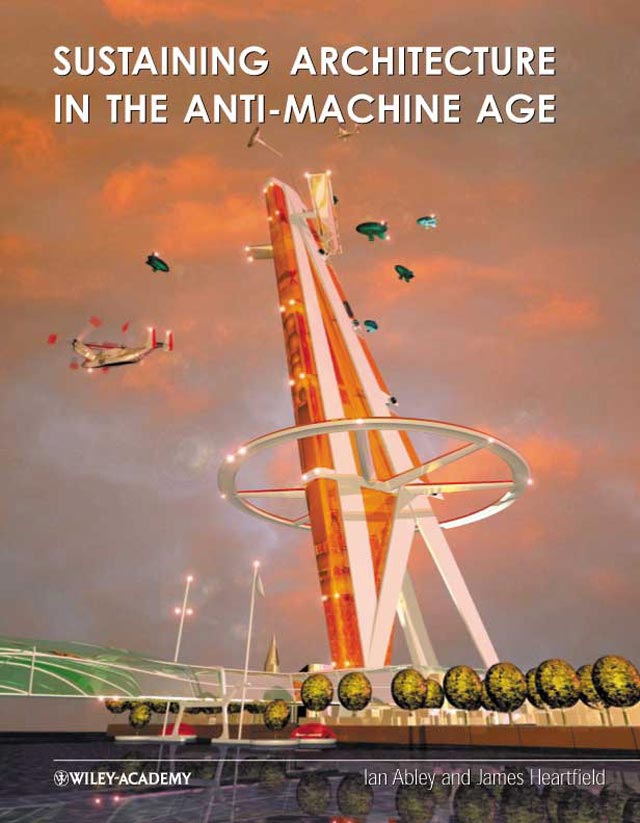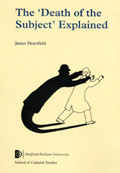Session 2: Sustainability Here and Now
Proceedings based on the notes of John Theaker, edited by Caspar Hewett
The Chair, Viv Regan, opened the session by pointing
to the way work has been undertaken at international, national and local levels
to advance sustainable urban development over the last decade. She then
introduced the two speakers for this head-to-head discussion on the benefits or
otherwise of the sustainability paradigm in the context of the developed world;
Allen Creedy, Project Director,
Peer Review for European Sustainable Urban
Development (PRESUD), Directorate of Enterprise, Environment and
Culture, Newcastle City Council and James Heartfield, editor
Sustaining Architecture in the Anti-Machine Age and author The 'Death
of the Subject' Explained and Need and Desire in the Postmaterial
Economy.
Allen Creedy opened with a presentation on the PRESUD project. PRESUD is a three
year project aimed at developing and testing a peer review tool that will
undertake a performance assessment of sustainable development in nine European
Cities. Performance Asessment is being used by the cities to develop and
implement an action plan. The action plan will improve the sustainable
development performance of the city by putting in place new policies and by
delivering new activities.
The objectives of the project are to elaborate on the OECD peer review
methodology, pilot a peer review tool in the partner cities over three years and
implement a SMART - action plans to achieve improved sustainable development
performance.
What are the issues? All areas - air water waste natural resource etc. . . social
and economic integration - energy - transport - regional co-operation -
environmental and social integration. The project has taken benchmarks from www.idea.org.uk/lgip and tested them at
EU level.
Results: Nine Reports have been produced. Thirty five politicians and technical
experts have been involved; the review teams are made up of these. High level
EU wide dissemination is taking place and there is OECD support for this
project. The project is attempting to challenge existing approaches to
sustainable development; all cities are implementing change and PRESUD is
contributing to understanding better how culture effects sustainable
development.
In closing Allen Creedy pointed out that in Newcastle there is no one
responsible for sustainable development, there is no cohesion of policy and
there is poor public consultation and participation. As a result Newcastle City
Council has set up an environmental partnership; this provides the audience with
a chance to get involved along with other stakeholder groups. The second review
is taking place on 2nd - 6th Febrary 2004 and the people
present were encouraged to join the debate.
James Heartfield sees us as the first post-scarcity generation and began by
asking why we are still clinging to scarcity. Having studied for a long time
the concept of sustainability he has concluded that it has no precise meaning,
only a vague intellectual framework for operating and developing policy. What is
brought to mind is the concept of scarcity itself. In 1943 a report was issued
about scurvy; "our rationing system is failing - our citizens are coming
down with scurvy." The civil service was very unsympathetic - they argued
that people were much healthier since rationing was introduced (although they
did say that some people in supervisory grades were suffering from strain!).
Heartfield pointed to the fact that those who lived through the post Second
World War period experienced real material want. This affected every aspect of
their lives and their way of looking at material things - they were, and had to
be, a scarcity minded generation.
In contrast it should be great for us, the first post-scarcity generation. There
should be parties celebrating an end to scarcity but in fact it makes us
fantastically anxious. The fact that there is food in the shops means that you
have to buy it all. This makes some people feel insecure and like
children some fail to eat responsibly which has led to the obesity situation.
There are no material limits to our immediate consumption needs - in the late
1970s it was oil that we thought would disappear. However we now know that
there are greater oil reserves today than there were in the 1970s. Already we
are developing the technologies beyond oil use - every time we have met an
obstacle we have overcome it. In the South East of England there is land
scarcity and in Britain as a whole there is a scarcity of houses. Why? Because
there has been a reluctance to build and so the houses that are needed have not
been built! So why not build some houses? Contrary to popular assumption there
is more and more land available every year, mainly because modern agriculture
does not require much land. There is also more forested land in Europe and the
USA now than there was a century ago.
So, James Heartfield asked, why are we afraid of superfluity? One reason is that
there is always a "milk monitor" - someone controlling the
distribution of things and these people don’t like abundance. For Heartfield it
is informed by existential fear; superfluity is something we are coming to terms
with and instinctively we imagine barriers to replace the physical limitations
on our abilities.
Allen Creedy picked up on Heartfield’s point about a lack of housing in the
South East. In the North East we have more housing than we need. Why not
encourage people to move north? Creedy went on to point out that in the majority
of the world there is enormous scarcity - maybe if we took a broader view than
our own narrow view we would recognise this.
James Heartfield expressed a small fear that any regeneration development
framework has an overarching theme. He had no doubt that PRESUD will result in
great developments and did not want to knock what they are trying to achieve,
but if the big theme is a kind of guilty nervous sentiment then that is a
problem. Giving some examples of recent positive developments Heartfield cited
China, who are racing ahead, and pointed out that life expectancy in the UK is
climbing. If you go to India and China those people are living longer and longer
too. What is more we are generally producing more than we consume. Korea is now
twelfth place among developed countries; this is a country that used to be seen
as poor. Heartfield does not think we should go around beating ourselves up - it
is good that the West is booming.
Allen Creedy argued for a principle that tries to find ways of continuing our
growth that does not produce wastes and does not use up non-renewable resources
- if we can move towards eco-efficiency then maybe we can continue our growth.
He argued that we need to be humble.
Asked from the floor whether there is a conflict between choice and sustainable
development, Creedy said that we all have a choice but it depends on how we are
looking at things; are we being inward looking or are we concerned with our
fellow man? If it is that latter then we do not have a choice. Heartfield
thought that the actual choices the market mechanism presents are mind-numbingly
boring. It presents a kind of fake choice which has reduced choice to a terribly
banal level which has led to us losing the sense that we can make decisions more
broadly.
Creedy stated that 40% of all road haulage is food and said that if we want to
reduce congestion we should buy local and not use supermarkets. In contrast
Heartfield sees this as a superb achievement that we do not have to eat locally
- it represents an amazing advance related to the economies of scale and
division of labour in the world today. For Heartfield, although it is true that
along rapid economic growth comes great disparity in wealth, if you have more
over all, then this tends to lift the standard of living of every sector of
society, even the poorest. In fact, perceptions of wealth are all relative; What
we call poor now would be seen as great wealth 100 years ago; Today, more than
50% of young people think that having a mobile phone is essential. Their values
are different and the floor of needs rises.
Creedy gave the example of Earth Balance as the sort of postive approach that
can be taken. Earth Balance is a project in Northumberland set up to help to
restore the natural balance between people and the environment. Based on the
concepts of regeneration, sustainability and community empowerment, the main
projects were related to organic farming, renewable energy generation and the
encouragement of small businesses which would function in a sustainable manner.
Creedy saw this and projects like it as giving us a choice by helping/enabling
us to support the local economy.
In his final comments, Allen Creedy described Heartfield as a bit of a rascal.
He argued that we have to subscribe to a system to survive and that we must take
account of scarcity. We may be currency privileged, but we have few skills,
have no subsistence and are highly vulnerable; if the system fails we are in
very big trouble.
James Heartfield proposed that we can better provide for future generations by
providing more - what is it that we think that future generations will be short
of? Shouldn’t we aim to provide those things? While it is true that the whole of
human society is less than 49 days away from starvation this is only because we
choose to create the means of existence through agriculture - We are
dependant on other people, but that is a good thing according to Heartfield.
However this can create great existential fear in times of conflict; people are
concerned that if the distribution network failed we would all starve. For
Heartfield the idea that the developing world feeds the developed world is an
oversimplification of reality; Europe and USA are belching out food surpluses
and this is one of the great examples of post scarcity. In his closing remarks
he bemoaned the way the benefits of this society that DO exist are all to often
ignored - the very real things that make our lives easier represent great
achievements of humanity. Not only that, we may want to leave a very dainty
footprint, but in actuality we want our cars and televisions - we love
stuff!
Top of page
Environmental Ideas in the 21st Century
What Future for the Developing World?
swiss made rolex datejust herren 16233bkdj 36mm silberton.best pet CBD oil U.K. review has made use of countless distinguished elaborate functions and skills.










